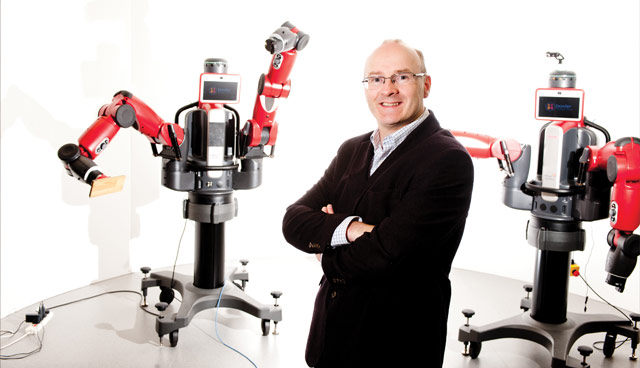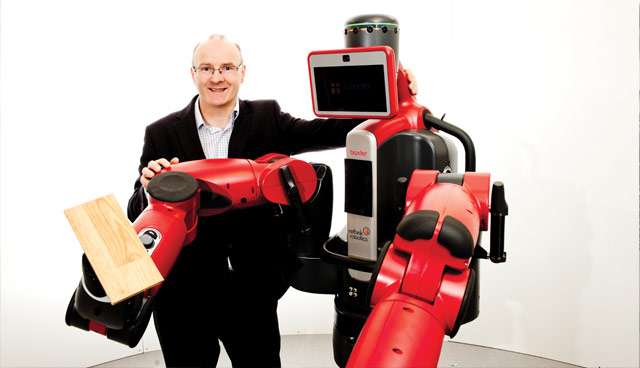Exploiting digital technologies to deliver the factories of the future

Professor Seán McLoone, Director of the Centre for Intelligent Autonomous Manufacturing Systems (i-AMS) at Queen’s University explores the challenges and opportunities arising from Industry 4.0.
The Fourth Industrial Revolution
It is generally accepted that manufacturing industry is in the throes of the Fourth Industrial Revolution, superseding those enabled by steam power, mass production and computer automation. At the core of this technological revolution is the connectivity provided by the internet and associated communication technologies, but it includes a spectrum of technologies including:
- Robotics and automation;
- additive manufacturing;
- Industrial Internet of Things (IIOT);
- Virtual Reality (VR) & Augmented Reality (AR); and
- Artificial Intelligence (AI) and data analytics.
The term Industry 4.0, which arose from the Platform Industrie 4.0 industry network initiative in Germany, is used to capture this technological change. Industry 4.0 is characterised by the fusion of the above technologies blurring the lines between the physical, digital and biological spheres to create Intelligent Cyber Physical Manufacturing Systems. In addition to the fusion of these technologies, Industry 4.0 is differentiated from previous technological changes by the exponential pace at which these technologies are evolving.
National governments have recognised the opportunities afforded by this “digitisation of manufacturing” with new policies, programmes and initiatives. The US ‘America Makes’ initiative has been created to advance the adoption of 3D Printing and additive manufacturing technologies within the US. In 2015, China launched its 10-year programme ‘Made in China 2025’ to transform Chinese manufacturing by harnessing the Industry 4.0 technologies.
Making smarter
In January 2017, as a result of the UK Government’s Industrial Strategy, Professor Juergen Maier, CEO of Siemens UK, was commissioned to undertake a review of industrial digitalisation in the UK. His review, ‘Made Smarter’ was published in October 2017 and provided a comprehensive review of the state of industrial digitalisation and made a set of recommendations for UK industrial policy.
Maier calls the underlying technologies Industrial Digitalisation Technologies (IDTs). At the core of the opportunity from IDTs is the opportunity to tackle the so called “UK productivity puzzle”. Maier highlights how in 2015 the UK worker GVA was 19 per cent lower than the G7 average and 36 per cent below Germany. Unlike its competitors, UK productivity growth has failed to return to pre-financial crisis levels and this is at a time when IDTs are evolving rapidly and at lower cost. While certain industrial sectors, such as aerospace, continue to deliver high value, there is a long tail of underperformers, particularly among SMEs and businesses with less than 5,000 employees. Improving the productivity of the bottom 75 percent could contribute an additional £130bn to UK GVA.
There is overwhelming evidence that IDTs can contribute to productivity and other benefits across a range of sectors. The ability to monitor production tool health allows more predictive maintenance and reduced downtime. The use of cross supply-chain information systems allows suppliers and customers to integrate their manufacturing information systems delivering more accurate forecasting and reduced delivery times. The utilisation of connected sensors within manufacturing processes can contribute to a much lower cost of quality.
Perhaps one of the most significant areas in which IDTs can contribute is in resource efficiency and the reduction of the environmental impact of manufacturing. The widespread use of production and process sensors in conjunction with data analytics will allow manufacturers to understand the energy, water and materials demands of their industries and to identify the opportunities for improvement in resource efficiencies.
In summarising the scale of the opportunity offered by IDTs, Maier concludes: “The positive impact of innovation and adoption of IDTs could be as much as £455 billion for UK manufacturing over the next decade, increasing manufacturing growth between 1.5 and 3 per cent per annum, creating a conservative estimated net gain of 175,000 jobs throughout the economy and reducing CO2 emissions by 4.5 per cent. We are confident that industrial productivity can be improved by more than 25 per cent by 2025.”
Industry 4.0
Queen’s University Belfast has as an extensive history of assisting local and international industry adopt and exploit advances in manufacturing technology. The Northern Ireland Technology Centre (NITC) has for 50 years acted as a bridge between the industrial and academic domains to deliver value for its industrial clients.
With expertise in product design, factory simulation, advanced machining, cost modelling, automation and advanced forming and joining, the NITC has played an active role in promoting new manufacturing technologies. For example, the NITC was the first organisation in Northern Ireland to adopt stereolithography 3D-printing technology for prototyping and product development and acted as a hub for the Virtual Engineering Centre which promoted the use of virtual reality technologies for design. The NITC was recently awarded £5 million of capital investment from the Aerospace Technologies Institute to equip it to support advances within the local aerospace supply chain. This includes investments in robotics and automation that will deliver projects to explore human and robotic co-operation; so called “cobotics”. These technologies are equally applicable to other sectors with, for example, the development of a flexible automation work space specifically for agri-food processing.
At the research level, Queen’s has responded to the challenges of Industry 4.0 by investing in a dedicated programme; the Centre for Intelligent Autonomous Manufacturing Systems (i-AMS).
i-AMS brings together a multi-disciplinary team of automation engineers, psychologists, manufacturing researchers and computer scientists to address challenges in virtual sensing, prognostics, factory simulation, automation and cobotics. i-AMS also maintains a core competency in manufacturing informatics: the application of sensing, big data and data analytics to the mass of data generated by new sensing technologies. i-AMS will exploit the advances in machine learning and artificial intelligence to develop intelligent supervisory and decision support systems.
AMIC: The Factory of the Future
The end vision for the application of IDTs has been termed the ‘Factory of the Future’.
These manufacturing environments will deploy automation and analytics to the extent that they will operate in a ‘lights out’ manner. Factories of the Future will use humans and robots as co-workers and be inherently flexible to deal with the mass-customisation of products demanded by business models focused on individual consumer needs.
Responding to the needs of industry, Queen’s has led a proposal within the Belfast Region City Deal (BRCD) to establish Northern Ireland’s own Factory of the Future. The Advanced Manufacturing Innovation Centre (AMIC) is a proposal that will establish a new facility that will integrate all the streams of manufacturing and materials technology development within Queen’s. It will provide a collaborative working space in which the latest IDTs can be deployed for experimental and pilot-production purposes.
AMIC will be established at the outset to integrate with UK and international digital manufacturing initiatives, in particular to act as a connector to the UK’s High Value Manufacturing Catapult centres.
It will support local companies in accessing innovation funding, particularly under Industry 4.0 programmes flowing from the UK’s Industrial Strategy.
Driven by the technology roadmaps of partner companies, the capabilities of AMIC will be shaped to ensure that Northern Ireland is strategically placed to address the challenges, while exploiting the opportunities afforded by Industry 4.0.
The Centre for Intelligent Autonomous Manufacturing Systems (i-AMS) at Queen’s was launched in June 2018 and is an interdisciplinary team of researchers working together to develop innovative technologies and solutions to address the challenges of digital manufacturing.






